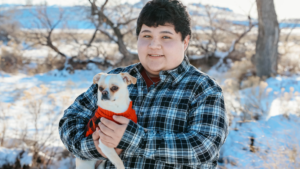This blog post is from Kerry Magro, an adult with autism who is a national speaker, author, autism advocate & consultant. Kerry is also the founder of KFM Making A Difference and the creator of a scholarship program for adults with autism.
I’m a college graduate!

I said this for the first time ever in May 2011 when I graduated from Seton Hall University. I had graduated with an undergraduate degree in Business Administration/ Sports Management. It was a time when I could be proud of all the hard work I had done and reflect on the path I traveled to get a college diploma. Who would have guessed when I was diagnosed with Pervasive Developmental Disorder- Not Otherwise Specified (a form of autism), that I would have reached this goal.
Because of the supports I had in grade/high school, and with the help of my family, I was able to achieve my dream. I was extremely lucky and blessed to say the least. And two years later (2013) I received my Masters in Strategic Communications and Leadership. Now I speak to groups throughout the country, sharing my story about growing up with autism and what I learned along the way.
I have seen so much potential in the young high school students I mentor. So many of them also share the dream of attending college if they get the opportunity. Unfortunately, one of my biggest concerns is the barrier college tuition may pose for these students reaching their dream.
On average, families with an individual on the autism spectrum have to pay $60,000 for supports and services annually. In my case, my parents had to pay a great deal out of pocket to insure that I could be provided with the therapies I needed to progress. In high school I only achieved average SAT scores due to my difficulty in taking timed tests. Even though I got accepted into all fifteen colleges I applied too, a thrill for me and my parents, I only received partial scholarships for many of them. The three colleges I wanted to attend were all private ones with tuitions between 40-45,000 a year. My Masters program added up costing us 50,000.
With costs for assistive technology devices and tutoring my parents ended up paying over a quarter of a million dollars for my post secondary education. My family was very disappointed to find that scholarship aid for those with autism was quite minimal. Programs such as Organization for Autism Research, the Rise Scholarship Foundation, Autism Society CVS All Kids Can and Autism Delaware provided small scholarships but nowhere near enough to pay today’s college tuitions.
So the unanswered question I’m often left with is: how do students with autism make it to college with limited aid and, most likely, having to pay out of pocket for tuition and additional supports? With 500,000 autistic individuals reaching adulthood within the next decade how will these students on the spectrum hope to achieve their dreams?
As many of the people in our autism community say it is going to “take a village” to help this cause. In the fall of 2012, in the hopes of helping our community, I started a scholarship for students with autism to attend college, the “Making a Difference for Autism Scholarship.” It is my way of saying to these students I believe you can do it!
Since the scholarship launched we’ve awarded 7 young autistic adults with scholarships. Jeremiah Swisher (who was one of our first graduates from Wisconsin-Whitewater), Derek Stine (Murray State University), Cameron Casali (Keene State College), Dani Bowman (Glendale Community College), Lydia Wayman (Southern New Hampshire University), Robbie Henderson (Sonoma University) and Paul Hislip (Rutgers University). As we continue to fundraise and give out these scholarships, we hope to gather all the scholarship winners together to write a book on our experiences in college that will go to raise more funds for the scholarship program.
I hope this effort starts people talking about autism and college. I want the students I mentor, and all those individuals with autism, to have the opportunity to succeed in college. So many people on the spectrum have to struggle with other issues in day-to-day living let alone with the possibility of getting to college. If they get close to getting to college let us, as a community, get them the rest of the way.
You can help donate to our Making A Difference for Autism Scholarship Fund here.














